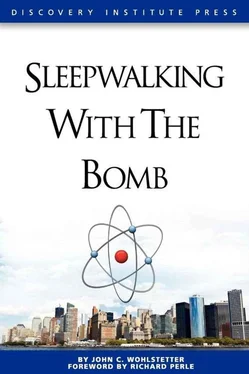John Wohlstetter - Sleepwalking with the Bomb
Здесь есть возможность читать онлайн «John Wohlstetter - Sleepwalking with the Bomb» весь текст электронной книги совершенно бесплатно (целиком полную версию без сокращений). В некоторых случаях можно слушать аудио, скачать через торрент в формате fb2 и присутствует краткое содержание. Город: Seattle, Год выпуска: 2012, ISBN: 2012, Издательство: Discovery Institute Press, Жанр: История, military, Политика, Публицистика, на английском языке. Описание произведения, (предисловие) а так же отзывы посетителей доступны на портале библиотеки ЛибКат.
- Название:Sleepwalking with the Bomb
- Автор:
- Издательство:Discovery Institute Press
- Жанр:
- Год:2012
- Город:Seattle
- ISBN:978-1-93659-906-6
- Рейтинг книги:3 / 5. Голосов: 1
-
Избранное:Добавить в избранное
- Отзывы:
-
Ваша оценка:
- 60
- 1
- 2
- 3
- 4
- 5
Sleepwalking with the Bomb: краткое содержание, описание и аннотация
Предлагаем к чтению аннотацию, описание, краткое содержание или предисловие (зависит от того, что написал сам автор книги «Sleepwalking with the Bomb»). Если вы не нашли необходимую информацию о книге — напишите в комментариях, мы постараемся отыскать её.
RICHARD PERLE, Resident Fellow, American Enterprise Institute and Assistant Secretary of Defense, 1981–1987 Sleepwalking with the Bomb
Sleepwalking with the Bomb — читать онлайн бесплатно полную книгу (весь текст) целиком
Ниже представлен текст книги, разбитый по страницам. Система сохранения места последней прочитанной страницы, позволяет с удобством читать онлайн бесплатно книгу «Sleepwalking with the Bomb», без необходимости каждый раз заново искать на чём Вы остановились. Поставьте закладку, и сможете в любой момент перейти на страницу, на которой закончили чтение.
Интервал:
Закладка:
History’s Twelve Vital Nuclear-Age Lessons
TWO-THIRDS OF a century offer up twelve guidelines for leaders in public office.
1. Arms control cannot be viewed in isolation, but rather must be considered along with an adversary’s conduct.
2. Arms agreements must be based upon genuine, not presumed, commonality of strategic interest.
3. Revolutionary powers cannot be contained; they must be defeated.
4. Nuclear weapons give nations a “dying sting” capability that virtually precludes preemptive action and confers near-total survival insurance.
5. The nuclear balance matters if any party to a conflict thinks it matters, and thus alters its behavior.
6. Civilian nuclear power inherently confers military nuclear capability.
7. Intelligence cannot reliably predict when closed societies go nuclear.
8. Ally proliferation can be prevented only by superpower constancy.
9. Popular pressure for unilateral disarmament can prevail unless Western governments explain its hidden, grave dangers.
10. Disarming hostile powers cannot be done by negotiations alone.
11. Never allow single or low-number points of catastrophic vulnerability.
12. Nuclear policy must be fundamentally defensive: its goal is to avoid the apocalyptic trinity of suicide, genocide, and surrender.
In applying these lessons it is supremely important to distinguish between three classes of adversary states: rivals, rogues, and revolutionaries. Rivals, like China and Russia, do not desire our outright destruction; their interests are too intertwined with our survival to allow for that. But they do desire to displace us in primacy of influence in world affairs. China desires to attain the supreme position it enjoyed for most of the past two millennia as the world’s preeminent power; it is beginning this quest by seeking to become primary power in the western Pacific region. For its part, Russia desires to regain the territories it controlled before the end of the Cold War. Rivals, however, may aid rogue regimes by transferring military and nuclear technology.
Rogues, like North Korea, do not necessarily seek to dominate a region. Rather they seek to ensure their own survival. Towards this end, nuclear weapons are the best survival insurance policy their leaders can purchase.
Revolutionaries, like Iran, seek not merely to adjust their position in the existing global order, but to overturn that order and establish a new one. Iran’s leaders are militant Islamists who ardently desire the destruction of Great Satan America and Little Satan Israel. These regimes are least likely to be peacefully persuaded to change their course.
Of the 12 lessons history offers as to nuclear policy, lessons 3, 6, and 11 are those that address the most immediate threats facing the civilized world: a revolutionary Iran in hot pursuit of nuclear weapon status (3); the danger of more rogue proliferation through careless diffusion of civilian nuclear technology (6); and the risk of nuclear blackmail if leaders leave their country open to potentially catastrophic single-point strikes from hostile powers willing to take extreme risks (11). Failure to fully meet these challenges would present civilized peoples with apocalyptic choices, with the least bad achievable outcome a Pyrrhic victory.
Over the medium term, the possibility of a nuclear crisis between major powers is also growing. Russia’s immense modernization program, encompassing diverse advanced technologies, is not consistent with a desire to move towards nuclear zero. China’s stunning half-century surge in strategic forces is hugely inconsistent with a focus on reductions. Its vast network of cavernous Underground Great Wall tunnels, clearly intended to house China’s advanced nuclear arsenal and shelter its leadership cadre, is way out of proportion to direct war threats China faces. We must convene an outside “B-Team,” one free of the intelligence community’s bureaucratic tendencies, to reliably ascertain the size of China’s nuclear arsenal before considering more disarmament. A “B” Team should also look at Russia’s broad range of nuclear modernization programs, especially risks of breakout via hidden nuclear assets.
Our peril grows as America’s pool of nuclear weapons experts drastically shrinks. Declining steadily over the past two decades, American expertise may be entirely gone from government labs in five years. The great nuclear scientists who retired take with them a matchless trove of expertise gleaned from decades conducting and assessing sophisticated nuclear tests. Unless their knowledge is captured and a sustainable growth path for nuclear weapon expertise is created, America in a decade or two may find itself with less overall nuclear weapon expertise than resides elsewhere. There is plenty of work for designers to build a replacement generation of safer, more reliable nuclear weapons. These would be more credible as deterrent weapons, and thus less likely to be used.
It is only in the long term—almost certainly decades, if not generations—that any decisive move towards nuclear zero might responsibly be countenanced. Premature disarmament can plunge the civilized world into a nightmare world order dominated by the most ruthless states and leaders on the planet.
If reelected President Obama must reverse his present course, or his successor must reverse course before it is too late. Else the nuclear Doomsday Clock likely will strike midnight once and for all, and the world will never be the same.
APPENDIX 1:
FICTION’S WAR AGAINST NUCLEAR REALITIES
THE COLD WAR SHAPED PUBLIC ATTITUDES FOR 55 YEARS. BUT THE focus on superpower nuclear war shifted dramatically after September 11, 2001, and attention turned to the possibility of terrorists using nuclear weapons. Nonetheless, attitudes implanted by fiction a half-century old persist in the public mind.
Nuclear tests above ground etched the mushroom cloud image indelibly on the public mind. Nuclear war became perceived in the public consciousness as inevitably an all-out exchange of the kind that ended Stanley Kubrick’s black comedy Dr. Strangelove, or How I Learned to Stop Worrying and Love the Bomb . The 1964 film was loosely based upon Peter Bryant’s 1958 novel, Red Alert , which had a happier, peaceful ending. Nuclear scientists and generals were portrayed in the film as lunatics, and the misleading image of one mistake triggering all-out superpower war became a staple. Nevil Shute’s On the Beach (1957) posited a global war fought with “cobalt bombs”—nuclear devices laced with intensely radioactive cobalt-60—in which survivors in Australia live out mankind’s last days. The war in that novel was started by Albania, and spread to larger powers until Russia and China exchanged massive cobalt-bomb salvoes, unleashing lethal radiation that atmospheric wind currents eventually spread worldwide. In Alas Babylon (1959) Pat Frank based all-out war on a single air-to-air missile with a conventional warhead fired by a U.S. Navy flier that missed its Russian target and slammed into a Russian military depot in Syria.
The novel Fail-Safe (published in 1962 and set in 1967) posed a scenario in which the American president avoids all-out destruction after the accidental obliteration of Moscow by consenting to a deliberate destruction of New York, equally without warning. And the thriller Seven Days in May (1962) featured a liberal president whose arms-control treaty induces a right-wing Caesar-general to attempt a coup; the general, readers and viewers were led to believe, would have unleashed a first strike against the Soviet Union.
A later, more credible take on nuclear peril was the 1980 thriller by Dominique Lapierre and Larry Collins, The Fifth Horseman , which has Libyan dictator Muammar Qaddafi, at the time instigator of numerous terrorist acts against the West, developing a three-megaton hydrogen bomb via stolen French technology. The device is smuggled into New York City, where its detonation could kill nearly 7 million people. The weapon is disarmed seconds before it is to detonate, thanks to intrepid detective work. In fact, since the mid-1970s Qaddafi had made a standing offer to purchase nuclear weapons from any seller.
Читать дальшеИнтервал:
Закладка:
Похожие книги на «Sleepwalking with the Bomb»
Представляем Вашему вниманию похожие книги на «Sleepwalking with the Bomb» списком для выбора. Мы отобрали схожую по названию и смыслу литературу в надежде предоставить читателям больше вариантов отыскать новые, интересные, ещё непрочитанные произведения.
Обсуждение, отзывы о книге «Sleepwalking with the Bomb» и просто собственные мнения читателей. Оставьте ваши комментарии, напишите, что Вы думаете о произведении, его смысле или главных героях. Укажите что конкретно понравилось, а что нет, и почему Вы так считаете.












